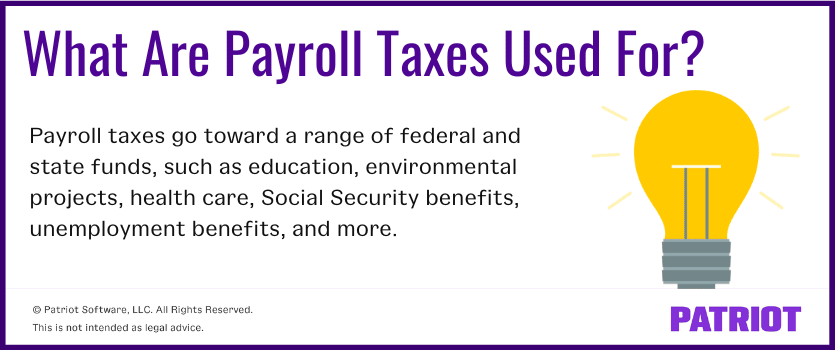With each payroll, you and your employees have to pay taxes. You collect and remit the money, but what are payroll taxes used for? What does the government do with that money?
If you’re curious, read on. We’ve got a list of each employment tax you withhold and/or contribute and where the money goes.
Employment tax overview
Being an employer comes with several responsibilities—including taxes. You need to withhold the following taxes from employee wages:
- Federal income tax
- State income tax (if applicable)
- Local income tax (if applicable)
- Social Security tax (employee portion)
- Medicare tax (employee portion)
And, you’re on the hook for several taxes. You must pay the following payroll taxes paid by employer:
- Social Security tax (employer portion)
- Medicare tax (employer portion)
- Federal unemployment tax
- State unemployment tax
With so many taxes, you or your employees may wonder what exactly they’re contributing to.
What are payroll taxes used for?
A variety of payroll taxes impact the amount of your employees’ net pay, but what do payroll taxes fund? Use the sections below to discover where payroll taxes go.

What do federal income taxes pay for?
You only withhold federal income taxes from employee wages. Your business does not pay federal income tax. There is no standard federal income tax rate. Instead, you determine how much to withhold based on income tax withholding tables, employee earnings and filing status, and information entered on Form W-4, Employee’s Withholding Certificate.
Withheld federal income taxes are credited to each employee when they file Form 1040.
Federal income taxes go to the U.S. Treasury General Fund. The Treasury then disburses money to government agencies based on the federal budget.
According to the IRS, federal income taxes fund national programs such as:
- National defense
- Veterans and foreign affairs
- Social programs
- Physical, human, and community development
- Law enforcement
- Interest on the national debt
What do state income taxes pay for?
Many states have a state income tax. Like federal income tax, only employees pay state income tax. There is no standard state income tax rate. Each state determines its own rate and whether it’s a flat rate or progressive. Generally, you must collect state W-4 forms from employees when they start at your business so you know how much to withhold.
State tax agencies disburse income taxes based on their budget.
States use state income taxes to fund state programs, such as:
- Education
- Transportation
- Health coverage for low-income families
- Economic development
- Environmental projects
- State police
- Parks and recreation
What does Social Security tax fund?
Both you and your employees pay Social Security tax. Social Security tax is a flat rate of 6.2%. Withhold Social Security tax from employee wages and pay a matching amount. Both the tax you withhold from employee wages and the amount you contribute are credited toward your employees.
The Social Security tax you remit is sent to the Social Security Trust Funds.
Social Security taxes fund Social Security benefits, including funds to support:
- Retired individuals
- Widows and widowers
- Individuals with disabilities
- Children and survivors of individuals
What does Medicare tax fund?
Both you and your employees pay Medicare tax. Medicare tax is a flat rate of 1.45%. Like Social Security tax, you withhold Medicare tax from each employees’ wages and pay a matching amount. There’s also an additional Medicare tax you may need to withhold from higher-earning employees’ wages. The tax is credited toward employees for both the employee and employer portions.
Medicare taxes are put into the Hospital Insurance Trust Fund.
Medicare taxes help fund Medicare benefits, including:
- Inpatient hospital care
- Skilled nursing facility care
- Home health care
- Hospice care
- Medicare program administration
What does FUTA tax pay for?
FUTA tax, or Federal Unemployment Tax Act tax, is an employer-only responsibility. Only you pay FUTA tax. Do not withhold any employee wages for FUTA. The FUTA tax rate is 6% on employee wages up to $7,000. However, most employers receive a FUTA tax credit of 5.4%, which drops their FUTA tax rate to 0.6%.
FUTA tax is placed into three federal accounts. The Employment Security Administration Account supports the administration of state unemployment insurance programs. The Extended Unemployment Compensation Account provides funds for the extended benefits programs. The Federal Unemployment Account provides loans for distressed state unemployment programs.
FUTA taxes help fund unemployment, including:
- Administration of state unemployment insurance programs
- Extended benefits programs
- Distressed state unemployment programs
What does SUTA tax pay for?
Like FUTA tax, only you pay SUTA tax in most states. SUTA tax does not come out of employee wages unless employees are in Alaska, New Jersey, or Pennsylvania.
Each state sets its own SUTA rates. You will pay SUTA to your state agency that handles the tax.
SUTA taxes fund state unemployment benefits for displaced workers.
Patriot Software makes payroll taxes easy. Our Full Service Payroll software will collect payroll taxes each pay period, and we will file and remit the taxes on time, guaranteed. Get a free trial now!
This article has been updated from its original publication date of October 5, 2016.
This is not intended as legal advice; for more information, please click here.






